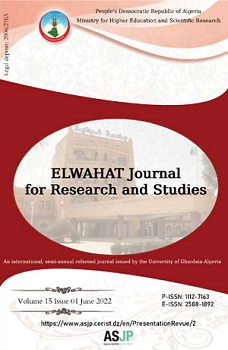From Globalization to Glocalization.Cloned TV Shows as A Model
Abstract
ABSTRACT:
This article treats the subject of Glocalization as the concept of an international product designed to satisfy the needs of a local population, and its role in adaptating any globally unified TV format that can be marketed, in any place in the world, to a successfull cloned TV show, by highlighting the process of going from the concept of Globalization to Glocalization and explaining the different concepts related to TV format and cloned TV shows that result from it, and how it actually is a form of adaptation. To finally discuss the important role that Glocalization can play, if used in specially TV Format Industry, in turning a TV format from a basic one marketed in different areas of the world to a successful cloned TV show that is faithful to the original template and reflects the individualities of the local environment.
KEYWORDS:
Globalization, Cloned TV Shows, TV Format.
الملخص
يسعى هذا المقال إلى معالجة موضوع العولمة المحلية باعتبارها تقوم على فكرة أن نفس المنتج أو الخدمة العالمية تكيف لتلبية احتياجات السكان المحليين، والوقوف عند دورها في تحويل أي قالب موحد لبرنامج تالفزيوني عالمي يمكن تسويقه في أي رقعة جغرافية من العالم، إلى برنامج تلفزيوني مستنسخ ناجح محليا. وهذا من خلال إلقاء الضوء على الانتقال من مفهوم العولمة إلى العولمة المحلية، وتوضيح مختلف المفاهيم المتعلقة بالبرامج التلفزيونية المستنسخة، وقوالب البرامج التلفزيونية المنبثقة عنها وكيف أنها في حقيقة الأمر عبارة عن تكييف لها. ليتم التوصل في الأخير إلى الدور المفصلي الذي يمكن أن تلعبه العولمة المحلية في حال ما إذا تم الاعتماد عليها في المجال الإعلامي والصناعات التلفزيونية، خاصة صناعة قوالب البرامج التلفزيونية في تحويلها من مجرد قوالب جامدة تسوق إلى أماكن مختلفة من العالم، إلى برامج تلفزيونية مستنسخة ناجحة محليا، تحافظ على قالب البرنامج الأصلي، وتعكس في نفس الوقت سمات وملامح البيئة المحلية التي تعرض فيها.
كلمات دالة : العولمة، العولمة المحلية، البرامج التلفزيونية المستنسخة، قالب البرنامج التلفزيوني.
References
Journals articles:
1-Albert Moran, Karina Aveyard, The Place of Television Programme Formats, Continuum: Journal of Media and Cultural Studies , Australia, volume 28 ,2014.
2-Andrea Esser, Television Formats: Primetime Staple, Global Market, Popular Communication, London , volume 8, number 4, 2010.
3- Amos Thomas, Keval Kumar, Copied from without and cloned from within: India in the global television format business, Book Title: Television Across Asia: Television Industries, Programma Formats and Globalization ,2003.
4- Chunying Yue , A Proposed Approach for Successful Cloning of Foreign Tv Shows in China, Intercultural Communication Studies , 2010.
5-Giampietro Gobo, Glocalization: a critical introduction, European Journal of Cultural and Political Sociology, Milan, 2016.
6-Habibul Haque Khondker, Globalization to Glocalization: A Conceptual Exploration, Intellectual Discourse, volume 13, number2,2005.
7-Jean K Chalaby, The Making of Entertainment Revolution: How The Tv Format Trade Became a Global Industry ,European Journal of Communication , London , volume 26, number 4, 2011.
8-Kirti, From Globalization to Glocalization: An Indian Prespective, Part of the Contributions to Management Science book series, Springer Link, 2019.
9-Michael Keane, Albert Moran, (Re)Presenting Local Content: Programme Adaptation in Asia and the Pacific, Media International, Australia, 2005.
10-Olivier Ejderyan, Norman Bakhaus, Glocalization the Link Between the Global and the Local, GLOPP , 2007.
Seminars articles:
1-Sukhpreet Singh, Tv Format Protection Through Marketing Strategies, Television Without Borders: Transfers, Translations and Transnational Exchange, United Kingdom, University of Reading, June 2008.
Websites:
1- Statista, The Ten Most Successful TV Formats World-wide Based on a Number of Experts from 1997 to 2009, • The ten most successful TV format exports worldwide 2009 | Statista Consulted on 14/03/2021 .







